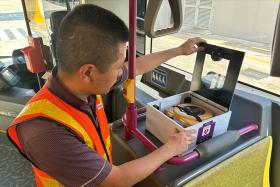Bike-sharing market has hit 'saturation point'
Control of fleet size vital because of oversupply, indiscriminate parking: Expert
The fleet size of bicycle-sharing operators in Singapore has become an issue because the market has hit "saturation point", an expert said.
Transport economist Walter Theseira of the Singapore University of Social Sciences told The New Paper that since the operators cannot generate more users to grow the market, they are now competing for a bigger slice of the pie among the same group of users.
They are doing so by growing their fleet to make their bikes more accessible, which in turn leads to oversupply and indiscriminate parking.
And these bikes are often left untouched for long periods because of the lack of demand.
"Limiting fleet size will go some way to solving this problem. If the Government controls the operators' fleet and makes them meet targets for quality and efficiency, that would help," Dr Theseira said.
The number of shared bicycles here came under scrutiny after the Parking Places (Amendment) Bill was tabled in Parliament earlier this month.
Under the Bill, the operators will come under the Land Transport Authority's (LTA) licensing regime, whereby each operator's fleet size will be reviewed every six months, based on such factors as fleet efficiency and how well it can manage illegal parking.
Those who fail to meet LTA's standards will face stiff penalties, such as fines of up to $100,000, reduction of fleet size, and suspension and cancellation of licences.
The Bill is set to be debated in Parliament this week.
There are an estimated 100,000 dockless shared bicycles currently, with about half in active use.
Operator ofo claims to have 70,000 bikes, having doubled its fleet size over the last four months.
GROWING DEMAND
Unlike Dr Theseira, Mr Christopher Hilton, ofo's head of policy and communications in South-east Asia, was bullish about growth opportunities.
He said: "Every minute of every day, hundreds of ofo rides are being started in Singapore...
"To meet this growing demand, we need to work with the authorities to improve the shared-bike infrastructure and specifically to create thousands of new parking spaces."
But Dr Theseira said that adding parking spaces might not be the answer.
"It does not remove the fundamental incentive that operators have to simply add more bikes to their fleet to gain more market share," he added.
Of the other main operators here, oBike said at the start of this year that its fleet was 14,000 while Mobike would only say its fleet is "in the thousands". They told TNP that they were committed to working with LTA on the problem of illegal parking.
Mobike Singapore's country manager Sharon Meng said: "We remain in close and sustained dialogue with the regulatory body and are reviewing our policies and procedures to ensure we are fully prepared to operate under new regulations."
oBike Singapore general manager Tim Phang said it will be implementing its geofencing feature to reward or penalise users based on their riding behaviour.
It is also "continuously looking" at how to use data collected from user riding patterns to improve its service, such as relocating bikes from areas of lower demand to higher ones.
Get The New Paper on your phone with the free TNP app. Download from the Apple App Store or Google Play Store now



